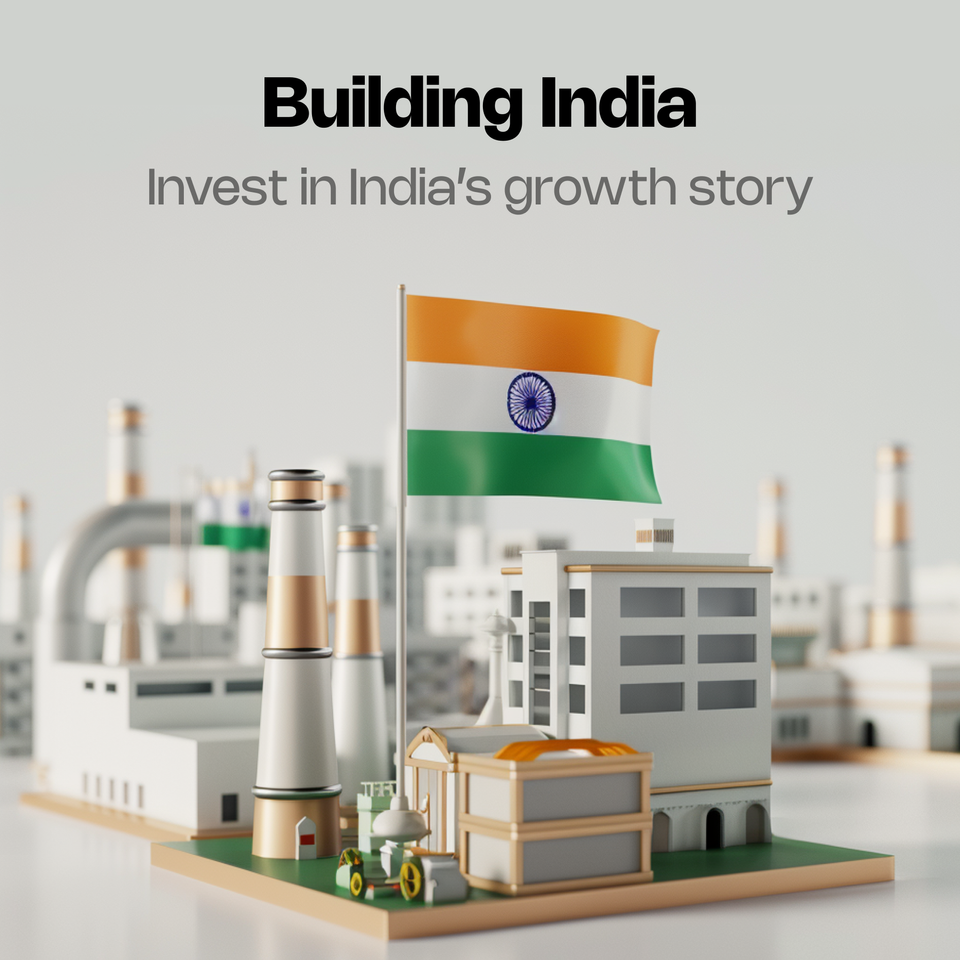Table Of Content
- Our Investment Strategy for Builidng India
- What do you invest in with Builidng India?
- Builidng India: Pros and Cons
- Builidng India: Annualised past returns
- Who should invest in Builidng India?
Quick Summary
Participate in India’s growth story through the infrasturcture sector. Invest in "Building India" a mutual fund portfolio that aims to ride the secular high growth opportunities in the Indian infrastructure space such as roads, railways, ports, and power.
With its ambitious plan to grow its economy from $3 trillion to $10 trillion, India offers astute investors a great chance to capitalize on its ravenous demand for strong infrastructure. The arteries driving the country's development are its roads, railroads, ports, electricity grids, and digital networks, all of which offer substantial financial rewards to those who labor on their creation.
Putting money into businesses that are creating this cutting-edge infrastructure looks like placing a wager on the cornerstone of India's economic future. Enhanced connection has the potential to reduce logistics expenses, opening up new markets and stimulating local trade. The green revolution will provide steady power, which will boost industry and open the door for a knowledge-based economy. Investments in sustainable water and sanitation systems, smart city solutions, and state-of-the-art digital infrastructure will turn India's cities into livable, innovative hubs as the country's population grows.
But making your way through this fascinating terrain demands careful consideration. Finding businesses with a track record of success, creative solutions, and potent execution skills is essential. Roads, trains, renewable energy, and digital infrastructure are examples of subsectors where diversification may reduce risk and seize a range of growth opportunities. Participating in public-private partnerships, which are essential to the development of India's infrastructure, provides exposure to significant projects and alluring returns that are calibrated for risk. Recall that in today's ESG-aware society, sustainable behaviors are not only morally required, but they also draw long-term investors.
The difficulties are as great as the possible rewards. As currencies fluctuate, clever hedging techniques are required. Because of the complexity of the regulatory framework, local competence is required. Furthermore, lengthy gestation times necessitate a patient, long-term outlook. But for those who are in the know, India's infrastructure story is about more than just making money—it's about being a part of a historic shift and building the foundation for a time when a billion dreams come true. Thus, fasten your seatbelts, seize your hard hats, and make an investment in the future of India's economy—a nation based on steel, concrete, and the unflinching determination of its people.
Our Investment Strategy for Building India
The portfolio of Building India has a flexi-cap investing strategy. Its holdings are split between debt and non-infrastructure stocks, with the majority of its assets being invested in infrastructure-related equities and securities. With a counter-cyclical strategy to avoid overexposed sectors, the technique seeks to balance risk and return through comprehensive research, encompassing top-down macro and bottom-up micro-analysis.
- A combination of bottom-up and top-down macro and micro research methods to identify stocks with long-term potential.
- Combine investments from different market caps, making opportunistic bets outside of benchmarks.
- Overexposure to the key industries that stand to gain from economic changes and the recovery of the capital cycle.
About Stack
Let the real experts manage your investments. Stack Wealth lets you access exclusive wealth creation opportunities by helping you invest in premium multi-asset portfolios managed by real experts.
Learn more
What do you invest in with Building India ?
- Businesses across all market capitalization involved in the infrastructure subject, such as communication, power, logistics, etc.
- Current factors influencing capital expenditures include coal gasification, 5G, data centers, and EV charging infrastructures.
- Initiatives with a government focus: clean energy, railroads, mining, defense, and EPC.
- Affordable housing and defense companies with strategic alliances are the focus of real estate.
Building India: Pros and Cons
Benefits
- Extensive performing history.
- Strong annualized returns.
- High potential returns over the following decade.
Drawbacks
- High risk because of shifting governmental directives.
- Exposure to small- and mid-cap enterprises causes high volatility.
- Focuses on a specific industry.
Building India: Annualised past returns

- The majority of infrastructure-focused funds have beaten benchmark indices over the last 1, 3, and 5 years. The Sensex and Nifty 50, which measure the performance of the 30 and 50 largest firms listed on the BSE and NSE, respectively, serve as the fund's benchmarks.
- It has a high risk rating.
- Benchmark: NIFTY 500- TRI
Want to know more?
Talk to our advisory team.
They will be happy to help you plan and manage your investments.
Talk to an expertWho should invest with the Building India Stack ?
Investors with a minimum 5-year investment horizon who wish to participate in India's economic boom may consider the Building India portfolio. An investor with a long investing horizon, a high tolerance for risk, an appreciation for the Indian economy, and a focus on diversification would be a strong fit for this portfolio. Because it makes investments in small- and mid-cap enterprises, the portfolio carries a high risk. But when the Indian economy expands and investments in vital infrastructure rise, it might yield large profits.

- This is ideal for the age group of 18 years upto 40 years
- This is for investors who delve in aggressive risk investing
- Investment horizon of 5+ years
- You can expect capital appreciation that matches economic growth
- This is ideal for investors with the financial goals of long term wealth creation and generational wealth.
FAQs
1. What are infrastructure mutual funds?
Infrastructure mutual funds invest in companies involved in building and maintaining India's physical infrastructure, like roads, bridges, airports, railways, power plants, and renewable energy projects. These funds can hold stocks, bonds, and other instruments related to these sectors.
2. Why invest in infrastructure mutual funds?
There are several reasons why infrastructure mutual funds can be attractive investments for Indian investors:
- Growth potential: India's infrastructure sector is expected to grow at a rapid pace in the coming years, driven by government spending and private sector participation. This growth can translate into strong returns for infrastructure mutual fund investors.
- Regular income: Many infrastructure companies pay regular dividends, which can provide investors with a steady stream of income.
- Hedge against inflation: Infrastructure assets tend to be inflation-protected, as their prices and rents often rise with inflation. This can be a valuable hedge for investors in times of rising inflation.
- Diversification: Infrastructure mutual funds can help you diversify your portfolio and reduce your overall risk.
3. What are the risks of investing in infrastructure mutual funds?
Like any investment, infrastructure mutual funds also come with risks. Some of the key risks to consider include:
- Project delays: Infrastructure projects can be complex and subject to delays, which can impact the performance of the underlying companies and the mutual fund.
- Regulation and policy changes: Changes in government regulations or policies can impact the infrastructure sector and the performance of mutual funds.
- Interest rate risk: Rising interest rates can make it more expensive for infrastructure companies to borrow money, which can impact their profitability and share prices.





